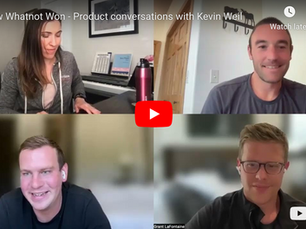Debunking Startup Myths: Iconic CMO Lee Applbaum on why brand matters from day one
- Apr 11, 2024
- 3 min read
Lee Applbaum is one of the world’s leading CMOs, having built and scaled brands at Bacardi/Patron/Grey Goose, Wheels Up, Target, and Radio Shack, among others. He’s now co-founder of Round 2 Spirits alongside a legendary group of fellow Patron executives. Lee and Elizabeth met in the early days of Twitter, when he and his team at Radio Shack were experimenting with the new platform. He has always been ahead of the brand curve. Scribble founders are fortunate to be able to call on him for marketing guidance, and it was our honor to uncover some of his biggest lessons for the greater founder community.
Joined by Scribble partner and former CMO Christen O’Brien, the group discussed:
Timing - shouldn't early stage founders focus on product before brand?
Calling B.S. - debunking popular myths about brand development
Emotive vs. Inciting emotion - a framework for tech brands
Resourcing - why your advisors should include a great marketer
Case studies - OpenAI, Stripe, Intel, & Liquid Death
Quick takeaways:
Should early stage founders focus on brand?:
Technology is the # 1 factor early on, but it's rarely enough on its own.
In the earliest days, your product, team, and runway matter most. So it’s critical not to underestimate how much your brand matters for customer acquisition, talent acquisition, and fundraising.
Tech founders tend to be highly rational. But consumers often make irrational decisions. They decide based on your brand. That's why even public markets and investors like Warren Buffett heavily factor brand into company valuations. They understand its power.
Brand is a force multiplier in every vertical, at every stage of a product or service, right from inception through maturation.
But isn’t the product the brand?
Not exactly. There are 2 sides to a brand - intrinsics and extrinsic.
Product is the intrinsic.
The extrinsic is how people think about your brand, and how your brand is positioned.
Some products require more focus on one or the other. But if you don't have the extrinsic, you don't have a brand.
There are some very, very basic human triggers that marketing leans into, and leverages the human condition.
Attention precedes awareness. You're just not going to get somebody to pay attention to you unless you make those evolutionary connections.
What makes a brand powerful?
Brands are not built on the logical benefit. They're built on the emotional promise.
Brands communicate ways to transform.
Example: "Intel Inside" communicated speed without the consumer having to know "how fast?". The question didn't matter, all consumers cared about was "is Intel inside?". Instead of pushing the technology, it created a consumer poll (FOMO is evolutionary!).
Another important lesson from Intel: It doesn't have to be emotive. But it does have to incite emotion.
Great question: Would someone want to rock your logo on a piece of swag? (Make it actionable: WHAT would make someone want to rock your logo on a piece of swag?)
Doesn’t building a brand require $$$?
Brands are built faster and cheaper than ever before.
Brands are an earned media game now.
Money is the smallest barrier today, creativity is the biggest. "We don't have the budget" really means "we don't have the creativity".
AI is fuel on that fire. AI = lower cost, tremendous speed, staggering quality level.
Cost is no longer a barrier - creativity is.
There's no substitute for exploring the network of people that you know to find a marketer.
Your advisory board should have a marketing expert! This is a no or low cost way to have advisors on board who have a vested interest in the success of the business and brand, who bring all that experiential capital to the table.
Marketers are a generous community. We most often want to share the blessing of the wisdom that we gained. And there's a certain healthy ego with marketers about wanting to put our fingerprint on things.
Lean into advisors, fractional marketers, any stakeholders with marketing backgrounds
Watch the conversation here.
Elizabeth Weil is Founder & GP at Scribble Ventures where she invests cross-sector in early stage companies. She was an early executive at Twitter, a former partner at Andreessen Horowitz, and also spent time at 137 Ventures, IVP, Menlo Ventures, and Radar Partners. She's also an angel investor in 100+ companies including SpaceX, Slack, Coinbase, Figma, Calm, Carta, and Superplastic. Christen O'Brien is a Partner at Scribble Ventures where she works closely with portfolio founders on all things marketing. She is a cofounding partner of 500 Startups where she built the global brand and network, and was previously CMO at NFX, leading brand, content, growth, and PR.








Comments